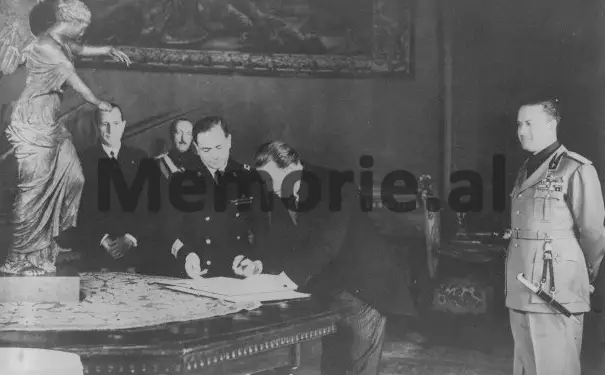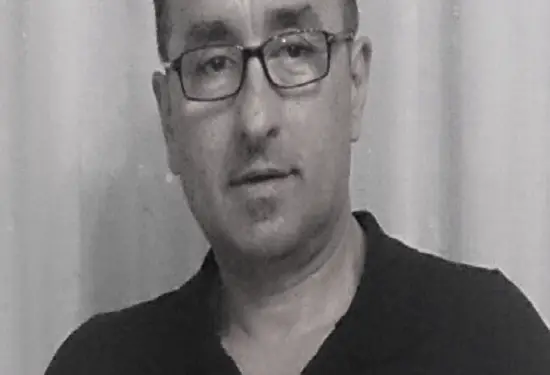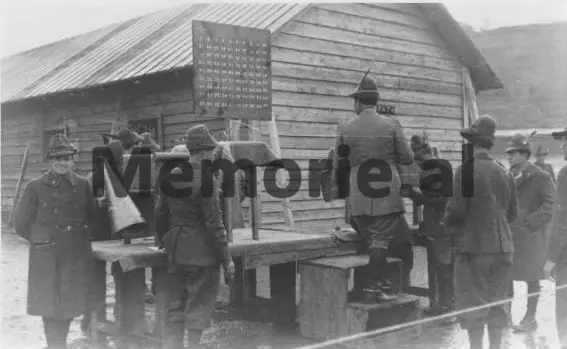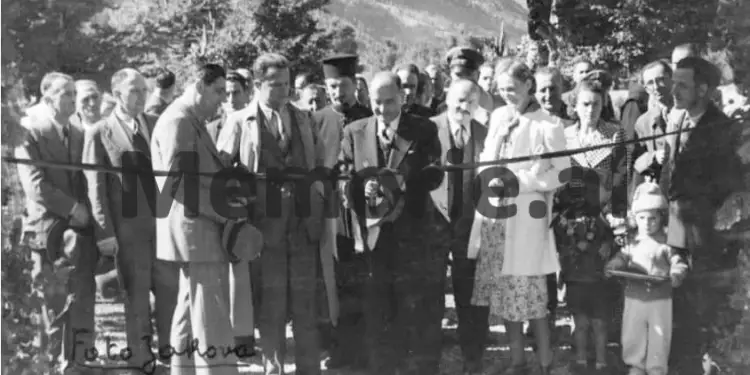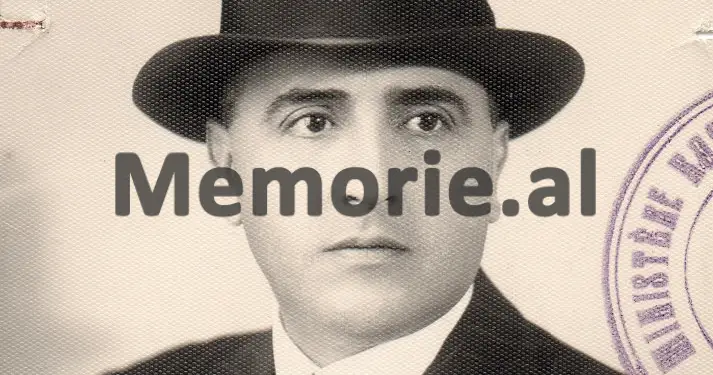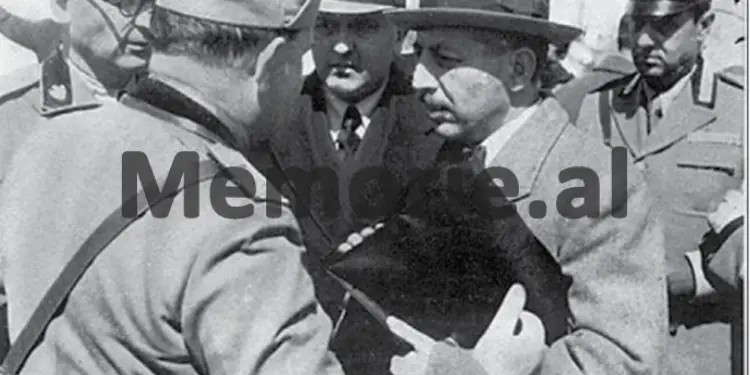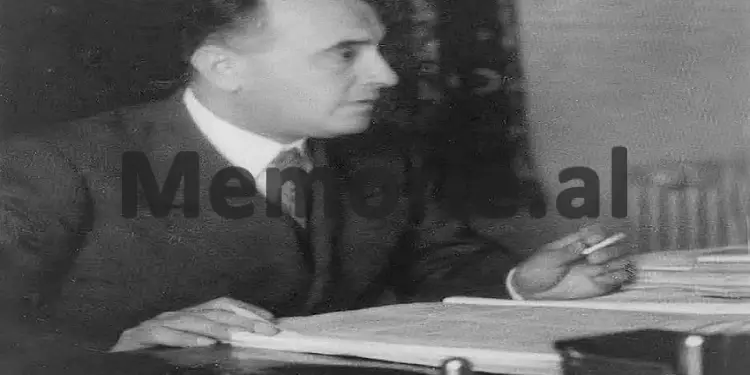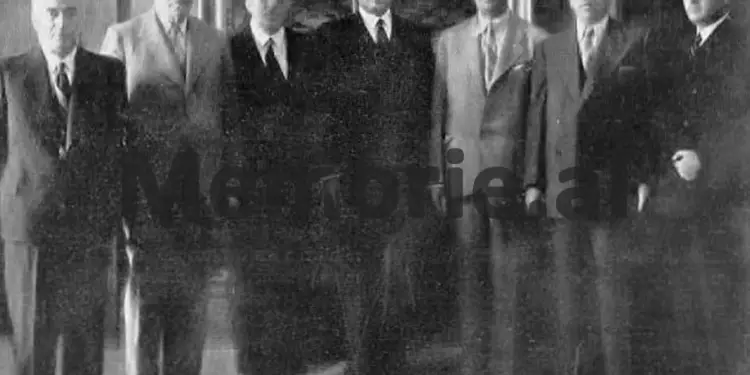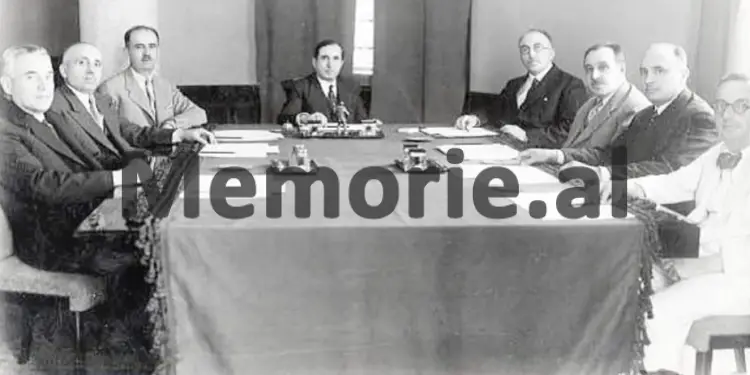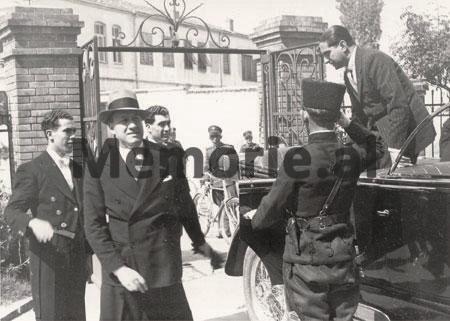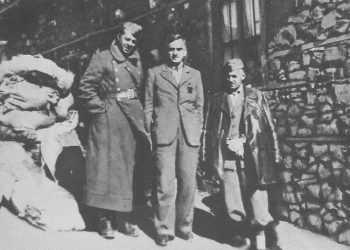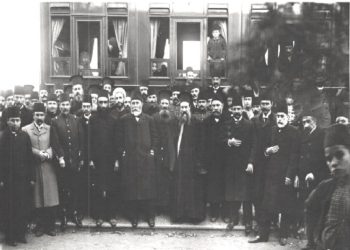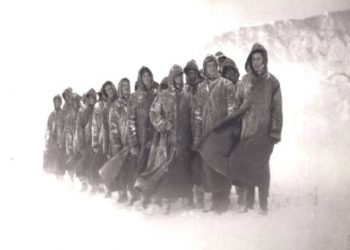By Arben Pustina
Part fifteen
-Rrok Gera, a proper statesman –
FORWARD
Memorie.al / This book aims to convey to the public the image of a perfect man, who lived in other times, but who was the best example, not only of what an ordinary man can represent, but, next first, as an example of a noble, distinguished, omniscient and, above all, honest statesman. Having in his genes the noble virtues of his origin, being formed as a personality in a wonderful environment, such as Shkodra at the beginning of the 20th century, and graduating from one of the most prestigious universities in Europe, such as that of In Vienna, Rrok Gera had all the potential to be one of the important figures who gave rise to a rapid development through comprehensive reforms in Albania in the 30s of the last century.
This development reached its peak with the government of Mehdi Frashër, considered perhaps the best Albanian government of all time, formed for the most part by non-political persons, among who was Rrok Gera. For 10 years, or more, as a minister or in other high state functions, he worked with conviction that he was walking on the right path for the consolidation of the Albanian state, a process for which he said he had no time to lose. Economist, financier, diplomat, lawyer, Gera was a specialist who advanced towards the top with his professionalism in an environment where the old factions, which were almost dominant in politics and governance, lost ground in front of young and educated people good.
Continues from last issue
MINISTER OF NATIONAL ECONOMY IN THE GOVERNMENT OF KOÇO KOTA
Next, at 05:25, about 45 minutes later than predicted, the Italians received the order to begin landing on the shores of Durrës. The fact is that on that day they were met with weapons and there were people killed on both sides. In Durrës, the fighting was quite fierce and the Italians were forced to retreat several times. Only the intervention of the fascist aviation and the great superiority of the landing forces in means and strength, little by little defeated the heroic defenders of Durrës, who were fighting under the command of Abaz Kupi. In the Diary of the Italian Supreme Command, General Guzzoni’s reports on the landing action are given, forwarded hour by hour to the War Cabinet in Rome.
The general himself claimed that this landing was in crisis from the beginning, since all of a sudden, the landing troops were met with a heavy fire of machine guns and rifles from about 500 Albanian forces. The commander-in-chief of the landing forces emphasized that: “…even after the artillery strikes of the ships accompanying the landing, the enemy fire was so strong that General Messe, commander of the first landing column, at 06:25, requested the intervention of large-caliber artillery of the fleet, to break enemy resistance”.
And according to the Historical Diary of the Italian Supreme Command, around 8:30, the defenders of Durrës began to withdraw gradually, while from 9:00, the city was considered occupied, although, as Guzzoni claimed, shots were still being fired from the windows of some buildings. At 9:30, the general himself descended from the ship to land, to see the situation closely. Around 10:00, the Albanian delegation, led by Rrok Gerë, arrived in Durrës, with a white flag and equipped with credentials, which were compiled in French. Some historians, including B. Fisher, etc., were wrong about the time of the start of the negotiations with Guxon in Durrës.
The Albanian version of the credentials was as follows: Excellence. By order of His Majesty, I have the honor to inform Your Excellency that His Excellency Rrok Gera, Minister of National Economy of Albania, and Mr. Lieutenant Colonel of the General Staff, Samih Koka, have been assigned to discuss with Your Excellency the basis of an agreement military that has to do with the cooperation of the Italian troops with the Albanian troops in Albania. Please, Your Excellency, accept the assurances of my highest consideration.”
According to the Historical Diary of the Italian Supreme Command, Guzzoni reported on the morning of April 7 that: Rrok Gera and Sami Koka, together with the above credentials signed by Foreign Minister Libohova, were presented to him at around 10:05 by the military attache Italian in Tirana, Gabrielli, in order to, according to the order of King Zog, negotiate an agreement with Italy.
In his report on Rome, Guzzoni argued that he received Rrok Gera and Sami Koka, because they were accompanied by the Italian attaché to Colonel Gabrielli, he received them because they could not appear before the landing began, and, above all, waited for them to listen to their proposals, since Ducja himself, as he said, attached great importance to negotiations with them. Streets with blood, people killed and wounded, smoke and buildings damaged by bombing. It was this serious scene towards which the Albanian delegation that was going to negotiate with Guzzoni in the Port of Durrës went that day.
Despite the very dramatic circumstances, negotiations took place and lasted from 10:05 a.m. until just before noon. As we said, the Albanian delegation was commissioned to negotiate the scheme of a military convention with Italy, which provided for the deployment of an Italian infantry formation in Albania, which would be under the command of King Zog. Through Marconigrams transmitted in code from the cruiser “Fiume”, at 12:30, Guzzoni urgently informed the War Cabinet in Rome that he received the proposal of the Albanian negotiators and told them that he would forward it to the Duke, who was the only one person who could decide on this issue.
The general himself assessed Tirana’s proposals as unacceptable. Also, he reported that, at the insistence of the Albanian side, he had accepted a cease-fire and that another meeting with the Albanian negotiators was planned. The deadline for the meeting was 16:00. But five minutes before this deadline ended, Shijak’s bridge over Erzen was blown up, so a second meeting was out of the question. The non-arrival of the negotiating delegation for the second time in Durrës, the chief aggressor of that day, Guzzoni, had the courage to call it an act of treason (!!!).
Meanwhile, in the extremely urgent telegram of 16:35, numbered 5788, a nervous Mussolini wrote to the commander of the landing forces, Guzzoni, to move the troops forward: “…Bird’s proposals are unacceptable. Don’t waste any more time and march towards the capital and the objectives, as the orders are …”! As we will see below in Ciano’s diary, Mussolini wanted to advance the invasion at any cost and as soon as possible, as he was anxious about any possible international reaction. However, the Italian advance would be very slow and the Italian troops entered Tirana on the morning of April 8, around 9:30.
About the events of April 7, the memories of the Royal Family, dictated by the adjutant, Colonel Hysen Selmani, speak. In his diary it was written that: “…Parliament and the government together, after brainstorming some ideas, decided to send a commission (to Durrës). For this, not that there was any hope, but not to fight because in this case, Albania was completely isolated and they even called it guilty. For this he decided to send without any conditions: the Minister of National Economy Rrok Gera, Lieutenant Colonel Sami Koka and the Italian military attaché in Tirana, Colonel Gabriel. They left and went to Durrës at 12 noon.
At the same time, the command of the army was ordered to order the command in Shijak to be free to pass (members of the delegation) and to return again according to the telegram. This is until the commission ends; the fire is stopped, as the enemy has no way to advance. When the Commission arrived in Durrës, of course the city was occupied by the Italians. But the commander (Guzzoni) was still in a warship and the delegation with a motorboat gone to the ship to General Guzzoni.
Among the talks they had, General Guzzoni declared that he had a telegram order from the Italian Minister of War, to stop any action, but to come to an amicable agreement and withdraw the forces. But the details haven’t come to me yet, – the general told them, – we’ll leave it for later, until they receive the details they order us by telegram. The time was set for 6:00 in the afternoon and the powers did not have to move a single step or fire until the talks were over.” We cannot know exactly what King Zog had in mind when he accepted the mission of the all-powerful delegation for talks with Guzon in Durrës.
Had he just wanted to buy some time, or was this a desperate attempt to save something and maybe he really believed that things could change for the better? We cannot know this, but it seems that things are somewhat clearer in the reports of the US minister in Tirana, Grant, after his meeting with King Zog, on the afternoon of April 6. In his telegram no. 765.75/444, Grant wrote to the American Secretary of State that Zogu had stated that he categorically rejected any Italian proposal that would violate the integrity and independence of the country.
Meanwhile, according to the American ambassador, the king had asserted that his army could not resist for long against the Italian troops so well equipped with weapons, so the Albanian resistance would be a kind of protest against the aggression, to show the world that the Albanians will not to surrender without a fight. It is also not known why Mussolini (according to Chiano’s idea) left this path for negotiations. Here, the thought can naturally arise that the Duke had hoped that the Albanians would accept everything, without conditions, frightened by all that military presence of the Italians.
For Duce, this would be a miracle, as it would create the impression that his troops entered Albania without a fight and the international reaction would be minimal, not to mention the internal opinion in Albania, which, according to him, would also be more hospitable to the invader. In fact, the events did not go like this and Rrok Gera did not go to Durrës to make a symbolic gesture, or to say that another diplomatic effort to oppose the invasion was fulfilled.
As he had done with every task he had undertaken before, Gera was determined in what he was doing, with the intention of saving what could be saved. He negotiated at length with Guzon and achieved something, such as the basis for a conditional agreement, as well as a truce of several hours. That day, a number of foreign newspapers quoted a Reuters reporter who, based on reliable sources, announced from Tirana that the Italian government had accepted the counter-proposals of the Albanians. However, events went as they did, as it seems that the two main characters of this story, Zogu and Mussolini, were less convinced than the negotiators themselves that a final agreement could be reached in Durrës.
Meanwhile, newspapers around the world reported on what was happening in Albania on Friday, April 7. The first to convey the news was the “Stefani” news agency, which gave the official announcement of the Italian Foreign Ministry. Then, the “Reuters” agency relayed the news from its reporter in Tirana about the Italian invasion operation. Much more information was received by the world opinion on the afternoon of April 7 from the newspapers, which received through Radio-Budapest, the news broadcast from Tirana every half hour.
Due to the schedule change, it was especially the US newspapers that wrote in detail about the event in question on Friday, while the European ones wrote in their issues of Saturday, April 8. In addition to major newspapers, such as “The New York Times”, “Los Angeles Times”, “The Times”, “Daily News”, “La Stampa”, “L’Humanite”, “L’Ouest Eclair”, “Vanguardia” , “ABC”, “Le Petit Parisien”, “La Croix”, “Le Matin”, “Le Petit Journal”, “L’Action Francaise”, “Diario de Lisboa” etc., for the negotiating mission in Durrës as an effort to to avoid the invasion of Albania, wrote in the editions of April 7-8 an infinite number of newspapers (all of them have been verified. – My St., A.P.), starting from the USA, Canada, Australia and up to New Zealand.
It is important to note that, what stands out in these newspaper pages, regarding April 7, 1939, is that the international opinion read a clear message: Albania fought that day, although it faced a military superpower. “The Albanians fight heroically”, “The Italians were pushed back four times”, “The main Albanian ports are bombed from the sea, the sky and the ground”, “The Albanians fiercely resist in the face of an enemy far superior in weapons and strength”, “Durrësi and Vlora are bombarded” , “Resistance Above and below are some parts of articles from the international newspaper of April 7-8, 1939.
In addition to the Albanian resistance to the invasion, the negotiating mission headed by Rrok Gera is highlighted among them. Against all this, the fact becomes even more paradoxical that, with the entire echo that the Albanian resistance had around the world, a part of the Albanian historians, in the past, but also nowadays, minimize it, equating almost to zero the fighting against fascist troops that landed on Friday, April 7, on our shores.
Returning to Gera’s negotiating mission, we note that in the positive amplification that the Albanian resistance had in world opinion, this mission had much more impact than it seems at first glance. Let’s argue: Italian landing operations began in the early morning. In Durrës, it was fought for about 4 hours and then the fire stopped to enable negotiations between the parties. These negotiations took place from 10:05 to after 11:35 (that is, over 1 hour and 30 minutes of talks and it is clear that it was not a formality) and, in the end, it was agreed that they should resume at 4:00 p.m.: 00 in the afternoon, yes in Durrës.
This did not materialize, but as the deadline for the second round of negotiations expired and evening approached, the Italian army was afraid to go any further. While it is known that the invading troops entered Tirana only the next day, at 09:30 on April 8, which means almost 30 hours after the start of military operations, we can come to the conclusion that, although for several hours the Italians were waited with rifles in Durrës, they would have entered Tirana probably since noon on Friday, if it were not for the act of the negotiating mission.
So, the delay of the Italians, which was the origin of the midday negotiations as well as those planned for the afternoon, caused that, in the eyes of world opinion, the Albanian resistance took on even greater proportions. How true this was, can also be seen in Mussolini’s anger at the delay in the advance of the troops towards Tirana, best reflected in the Diary of Count Ciano, where his memories of April 7, 1939 are quoted: “…Guzzoni met with representatives of Zog and, instead of continuing the military action, as Ducja had ordered, suspended everything for 6 hours. Ducja is furious with anger: this delay could have very serious consequences. We need to get to the capital to make our political maneuver. Through Vale, the Duke ordered the march to resume, but a whole day was wasted and this enables the always stinking French press to say that the Italians were defeated by the Albanians”.
One of the foreign authors who have addressed this moment, Massimo Borgogni, writes in his book (“Tra Continuita e Incertezza: Italia e Albania” (1914-1939), about the negotiations held in Durrës between the Albanian delegation and Guzzoni: “. ..Albanian parliamentarians and the Italian military (the Italian military attache in Tirana, Gabrielli. – Shën. im, A.P.), arrived in Durrës around 10 o’clock, while the landing of materials and vehicles was not without difficulty from the ships, and the northern heights above the city were occupied after the bombing that the aviation had done to the Albanian troops concentrated in the branch of Vora, a strategic point on the road to Tirana. General Guzzoni got acquainted with the Albanian proposals for a military convention…”!
Further, among other things, Borgogni also writes about the interruption of the advance of the fascist troops: “…It was clear that by accepting the request for the suspension of operations in Durrës, the Italian general went far beyond the instructions received from Ciano on the evening of late on April 6, then reconfirmed during the night, by Mussolini. He personally took responsibility for the sudden cessation of operations, since such a decision would definitely bring a big delay in the occupation of the Albanian capital and in the full implementation of the “Oltre Mare Tirana” operation. In addition to waiting for the Albanian delegation (which had arrived in Durrës 5 hours late), Guzzoni’s decision should have been made as a result of the fact that things were not going as planned.”
Regarding the debates that arose in Rome due to the temporary cessation of combat operations by the Italians, Borgogni notes that in Italian circles there was initially even thought of a conspiracy by the Italian Ministry of Defense, with the aim of sabotaging the work of the Foreign Ministry, but today, historiography has completely ruled it out as an idea, giving arguments for it. Historian Bernd Fisher, in his two books “King Zog and the effort for stability in Albania” and “Albania during the war 1939-1944”, gives details about the negotiations in Durrës: “… Zog once again tried to find a solution another with the Italians, sending Guzzoni two emissaries, as Mussolini had suggested. Around that afternoon, under the protection of the Italian attache, Zogu sent the Minister of National Economy, Rrok Geraj, as well as Colonel Sami Koka, to talk with the Italians in Durrës”. Memorie.al
The next issue follows




